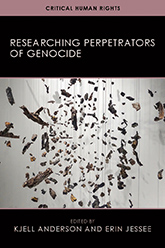|
Researching Perpetrators of Genocide
Edited by Kjell Anderson and Erin Jessee
Critical Human Rights
Scott Straus and Tyrell Haberkorn, Series Editors; Steve J. Stern, Editor Emeritus
“For those interested in understanding genocidal violence from the perpetrator’s perspective, this volume brings you insights from scholars with firsthand experience interviewing killers. And for researchers sensitive to the ethical and methodological challenges of working with perpetrators, you will value its practical guidance.”
—Omar McDoom, London School of Economics
Researchers often face significant and unique ethical and methodological challenges when conducting qualitative field work among people who have been identified as perpetrators of genocide. This can include overcoming biases that often accompany research on perpetrators; conceptualizing, identifying, and recruiting research subjects; risk mitigation and negotiating access in difficult contexts; self-care in conducting interviews relating to extreme violence; and minimizing harm for interviewees who may themselves be traumatized.
This collection of case studies by scholars from a range of disciplinary backgrounds turns a critical and reflective eye toward qualitative fieldwork on the topic. Framed by an introduction that sets out key issues in perpetrator research and a conclusion that proposes and outlines a code of best practice, the volume provides an essential starting point for future research while advancing genocide studies, transitional justice, and related fields. This original, important, and welcome contribution will be of value to historians, political scientists, criminologists, anthropologists, lawyers, and legal scholars.
Kjell Anderson is the author of Perpetrating Genocide: A Criminological Account and the director of the Master of Human Rights program at the University of Manitoba.
Erin Jessee is the author of Negotiating Genocide in Rwanda: The Politics of History and a senior lecturer in history at the University of Glasgow.
Praise
“Offers a series of timely and incisive reflections on the ethical and methodological challenges that confront researchers in the fields of genocide and perpetrator studies. Not only does it shed critical light on the vexed issue of categorization, but it also offers valuable perspectives on how to approach our own preconceptions and positionality within the field.”
—Susanne C. Knittel, editor of The Routledge International Handbook of Perpetrator Studies
“Introduces scholarly readers across disciplinary fields to the challenges and rewards of research concerning perpetrators of atrocity crimes. This book captures the current 'moment' of perpetrator studies, where the complexity of the perpetrator is no longer strictly a taboo subject. . . . The interdisciplinary appeal of this collection is one of its strongest points, carrying a huge potential for continued conversations within a subfield (genocide studies) predominantly occupied by historians. . . . Anderson and Jessee have started an important conversation in terms of practice and ethics that must be continued.”
—H-Africa
|

Larger images
December 2020
LC: 2020010781 HV
224 pp. 6 x 9
|

